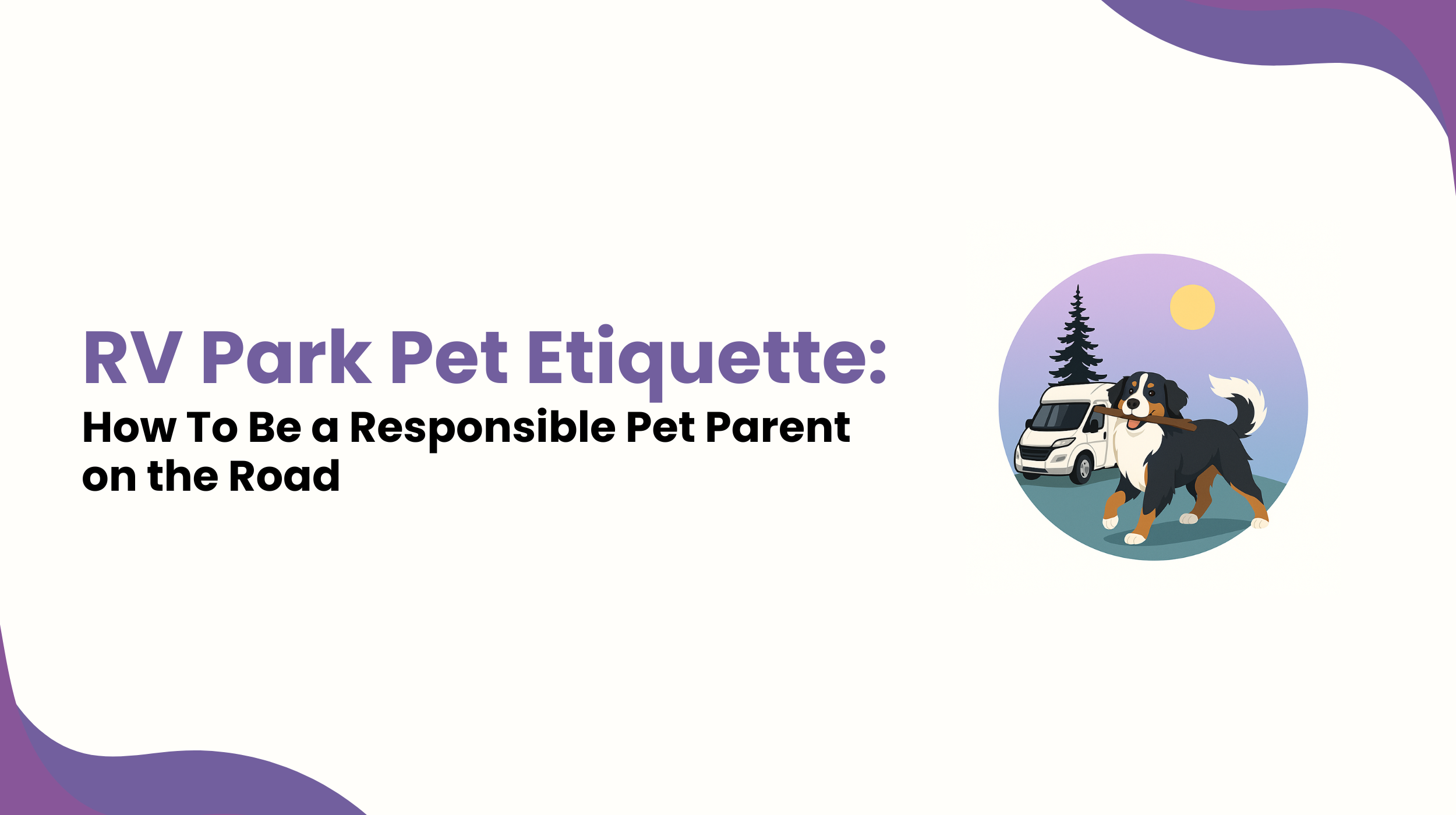Bringing your furry friend along on your RV trip? You’re not alone. More RVers than ever are hitting the road with pets in tow, and it’s easy to see why. Dogs and cats love the fresh air, new smells, and being by your side 24/7. But making your pet part of the RV experience comes with responsibilities. Following basic pet etiquette is essential, whether you’re parked at a high-end resort or a rustic state park. In short: leash your pets, clean up after them, and respect fellow campers who may not be as enamored with your four-legged travel buddy. Here’s how to make sure your pet is a welcome guest at any campground.
Always Leash and Supervise Your Pet
At nearly every RV park in the country, leashing your pet is more than a courtesy; it’s a requirement. Rules vary slightly from one campground to another, but most enforce a six-foot leash rule when pets are outside your rig. That means no retractable leashes stretched across walking paths and no letting your dog wander freely, even if they’re well-behaved.
Think of it from the perspective of your neighbor sitting outside, sipping their morning coffee. A surprise visit from even the friendliest golden retriever could be stressful, especially if their own dog is tethered nearby or young kids are around. Worse, your pet could get spooked and run off, get injured, or start a scuffle with another animal.
Supervision matters too. Never leave your dog tied up outside unattended. Weather changes quickly, wildlife is unpredictable, and your pet could become anxious or defensive when alone. If you’re relaxing at your site, consider setting up a secure pet pen where they can safely enjoy the outdoors with you nearby. Portable fences like the FXW Dog Playpen or IRIS Exercise Panels are popular with RVers for this very reason. They allow for freedom of movement while still respecting campground boundaries.
Pick Up the Poop
The golden rule of RV pet etiquette? Pick up after your pet, every single time.
It might seem small, but dog waste left behind is one of the top complaints among campground owners and guests alike. It’s not just unsightly and smelly, it’s a health hazard. Pet waste can carry harmful bacteria and parasites that affect people and other animals. And in natural areas, it can disrupt local ecosystems or attract unwanted wildlife.
Many RV parks make cleanup easy by offering free doggy waste stations with bags and bins along walking paths. For example, Sun Outdoors Petoskey Bay Harbor in Michigan and The Vineyards Campground & Cabins in Texas have designated pet waste areas with plenty of stations to help pet owners stay on top of things.
But don’t rely on stations being available. Always bring your own waste bags and dispose of them properly. Tucking a few extras in your pocket or hanging a bag holder from your leash ensures you’re never caught off guard.
Mind the Barking (Quiet Pets = Happy Neighbors)
A barking dog can quickly go from cute to contentious when you’re in a quiet campground surrounded by other travelers. Most RV parks have posted quiet hours, often starting around 10 PM, and excessive barking can break those rules just as much as a noisy generator.
Of course, some barking is natural, and no one expects total silence. But if your dog tends to bark constantly at squirrels, passing golf carts, or other dogs, it’s up to you to manage their behavior.
Start by minimizing triggers. Keep blinds closed if they get riled up by activity outside the RV. Turn on a white noise machine, fan, or the TV to mask outside sounds. Interactive chew toys or treat puzzles can help distract anxious or bored pets.
And most importantly, never leave a barking dog alone in the RV for long periods. If you’re going hiking or out for a long excursion where dogs aren’t allowed, consider pet-friendly alternatives like Rover.com for dog sitting or day boarding options near the campground.
Some parks, like Campland on the Bay in San Diego or Normandy Farms Campground in Massachusetts, have strict rules about excessive barking and may ask you to leave if it becomes a repeated issue. A peaceful campground benefits everyone, your dog included.
Use Designated Pet Areas & Respect Restrictions
Many RV parks go above and beyond to make pets feel welcome. It’s common to find dog parks, agility courses, or shaded walking trails explicitly designed for canine companions. Using these designated areas isn’t just about giving your pet exercise but also about respecting shared spaces.
Check the campground map or ask at check-in where pets are allowed. If a sign says “no pets on the lawn” or “no dogs near the pool,” follow it, even if no one is watching. These rules are often put in place due to allergies, safety concerns, or past incidents.
When there are perks for pet owners, use them! At Four Paws Kingdom Campground in North Carolina, RVers enjoy amenities like dog washing stations, off-leash play zones, and even canine agility classes. Participating in these offerings shows you appreciate pet-friendly policies and helps set a good example for other travelers.
Also, remember to keep your pet under control even in off-leash zones. Just because leashes aren’t required in a dog park doesn’t mean you can tune out. Watch for signs of stress or aggression in your dog and others, and always intervene if play gets too rough.
Do All RV Parks Allow Pets?
While most RV parks are pet-friendly, don’t assume it’s a given. Always check the pet policy before booking, and read the fine print, especially if you have more than two pets or a large breed dog.
Some RV resorts limit the number of pets per site or have breed restrictions based on insurance policies. Others may charge a small pet fee or require documentation of up-to-date vaccinations. For example, KOA Journey Campgrounds are typically pet-friendly across the board, but individual locations may have their own restrictions.
Unusual pets, like birds, rabbits, or reptiles, can also fall into gray areas. If you’re traveling with anything other than a dog or cat, it’s best to call the office beforehand and clarify whether your companion is welcome.
For peace of mind, consider RV parks that market themselves as pet-friendly destinations. Pet Friendly Campgrounds USA and BringFido.com are helpful resources to locate parks where your pets will feel at home.
Traveling with Pets Done Right
Taking your pet along on an RV trip can be a deeply rewarding experience. Watching them explore new trails, snooze beside a campfire, or greet the sunrise from your motorhome’s dash makes for unforgettable memories. But to ensure those memories are positive for you, your neighbors, and your pet, etiquette matters.
Leash and supervise your pet. Clean up after them promptly. Respect quiet hours and use designated pet areas. And above all, remember that you’re sharing a space with others who may not be as enthusiastic about pets as you are.
Being a responsible pet parent on the road doesn’t mean sacrificing fun; it just means planning ahead, being courteous, and treating fellow campers and campground staff with the same respect you’d hope for in return.
So pack the treats, load up the leash, and hit the road. Your next pet-friendly RV adventure is waiting!

